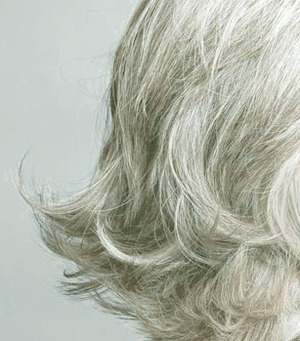Navigation
Hair Loss News Archives
March 2013
A Pill To Prevent Gray Hair - Is It Finally On The Way?
In the past three years, the concept of popping a pill to prevent gray hair has been fast-tracked from fantasyland to almost-reality.

First came the groundbreaking British study published by FASEB (the Federation of American Societies for Experimental Biology) in 2009 exposing the mechanism that governs loss of hair pigment.
Researchers at the University of Bradford in the UK demonstrated how over time, accumulated oxidative stress leads to the overproduction of hydrogen peroxide in the hair follicles.
In other words, the hair begins to bleach itself from the inside out. The buildup of hydrogen peroxide begins to block the production of melanin, the pigment that gives hair its blonde, red or brown color.
Underlying this process is a series of complex chemical mechanisms involving the effects of oxidative stress and follicle damage on key enzymes.
One is catalase, which is supposed to break up the hydrogen peroxide into water and oxygen so the body can eliminate it. But catalase levels drop as we age, allowing hydrogen peroxide to accumulate unchecked.
Two other enzymes, known as MSR A and B, are supposed to stimulate hair follicles to repair the damage, but levels of MSR A and B drop with age as well. Without enough MSR A and B, the body can’t produce enough of another enzyme, tyrosinase, which is directly involved in melanin production.
A New Consumer Market: Gray Hair Prevention
All of these enzymes give drugmakers new targets for medications and supplements aimed at boosting levels of catalase, MSR A and B, and tyrosinase. Cue the rush to market.
One such drug has already been announced by L’Oreal, which promises a 2015 market launch. A fruit extract about which little else is known, L’Oreal’s product acts on the production of tyrosine-related protein TRP-2. Of course, there’s no need to point out that a no-gray-hair pill could make L’Oreal a great deal of money. L’Oreal researcher Bruno Bernard was quoted by the Christian Science Monitor as saying the company already has a “watertight proof of concept” and will be in full production by 2015.
Smaller companies and supplement manufacturers aren’t waiting in the wings, though. They’re mounting online sales campaigns and putting new products on health food store shelves everyday.
The best known of these, having mounted an impressive viral marketing campaign, is Go Away Grey, manufactured by Rise-N-Shine LLC of New Jersey. Go Away Grey, which has been covered in a plethora of women’s magazines and newspapers, contains 5000 IU of catalase and a cocktail of L-tyrosine and tyrosine-boosting plant extracts, with the promise that boosting catalase and tyrosinase levels will prevent graying.
More catalase-based supplements are arriving everyday.
Other contenders include Anti-Gray Hair 7050, No More Gray with Catalase, and Anti Grey Pure by Absonutrix.
Do they work? Hard to say. The road is littered with discarded vitamins and minerals that made perfect sense but proved to be digested and excreted without effect. Some experts have suggested that it may be more effective to supplement the minerals such as zinc and selenium that the body uses to produce catalase, MSR A and B, and tyrosinase, rather than take them directly. Spinach, avocados, and liver are rich in catalase, so you could always try adding these to your diet for a more natural approach.
Next Step: Risk Warnings from Docs
Of course, we’re talking about important enzymatic reactions here, and doctors immediately reacted to the L’Oreal announcement by cautioning that there may be significant risks to meddling with basic biology in this way. Without a product available from L’Oreal to test, however, it’s hard to argue for or against health concerns. One would hope that the anti-gray supplements already on the market have been proven safe. But there’s no way of knowing that, either. Supplements are not subject to the same regulatory scrutiny by the FDA that new drugs must undergo.
Don’t Throw Away Your Hair Dye Yet
Unfortunately, if you’re already gray or quickly getting there, the new pills won’t help you much. They have the potential to stop the graying process, but so far no one’s suggested any ability to reverse it. In fact, L’Oreal’s Bruno Bernard specifically warned that people will likely need to begin taking L’Oreal’s new supplement well before (as much as ten years before!) they would expect to begin turning gray to see the full effects.
